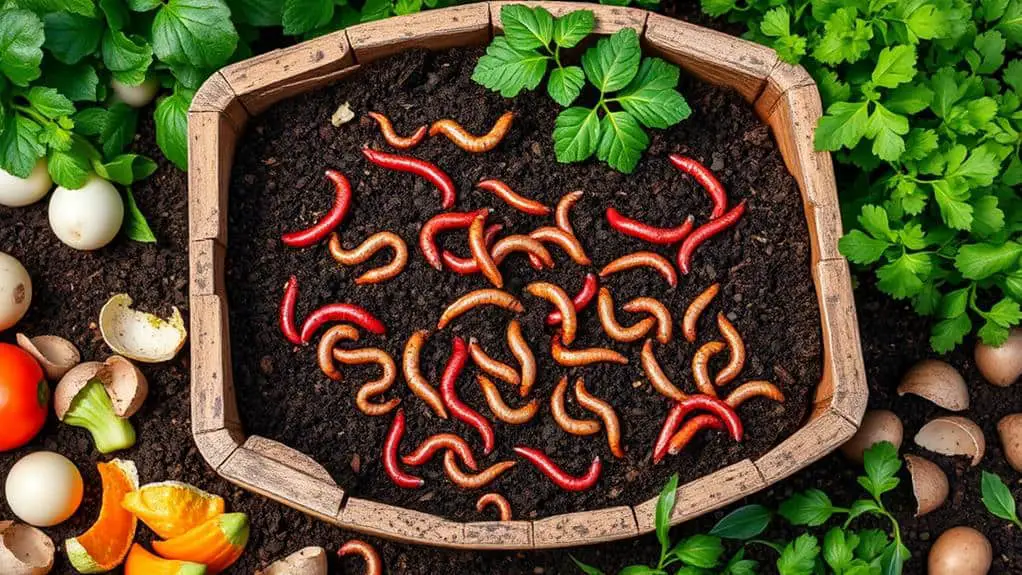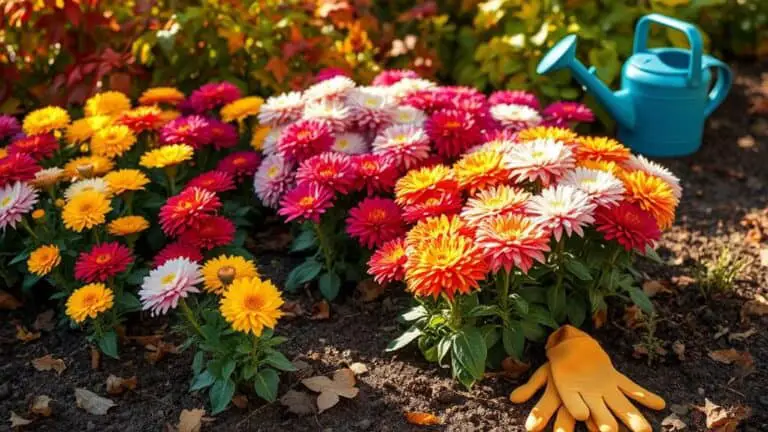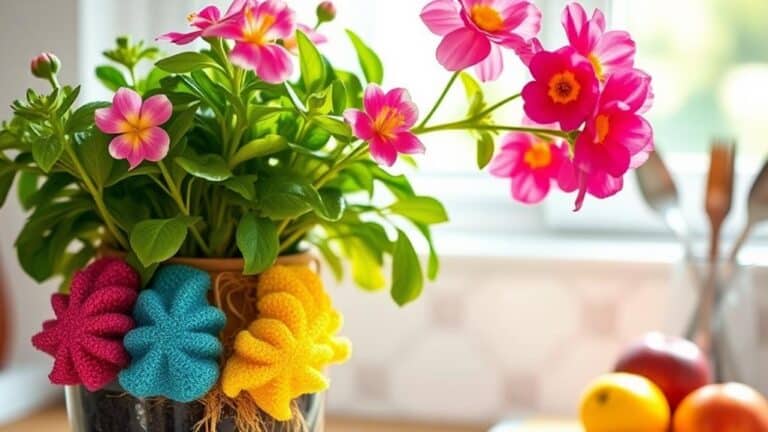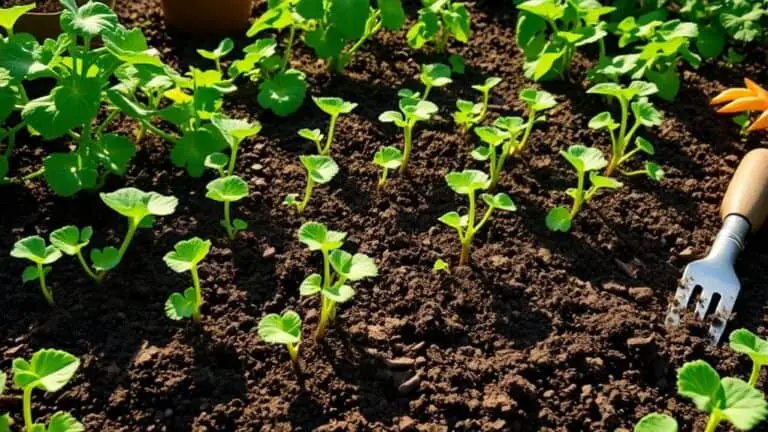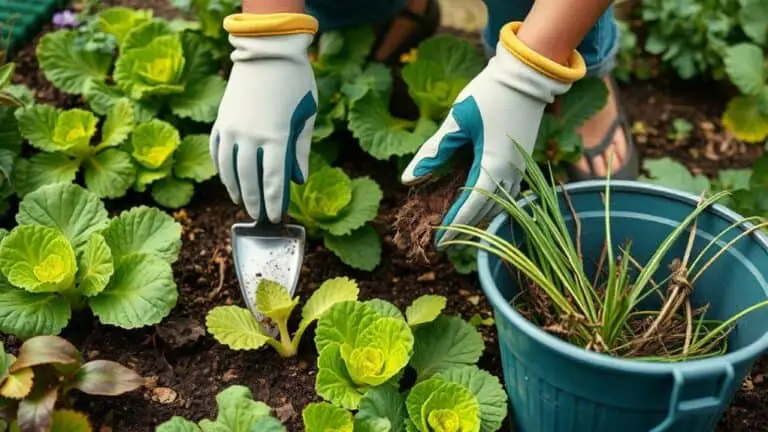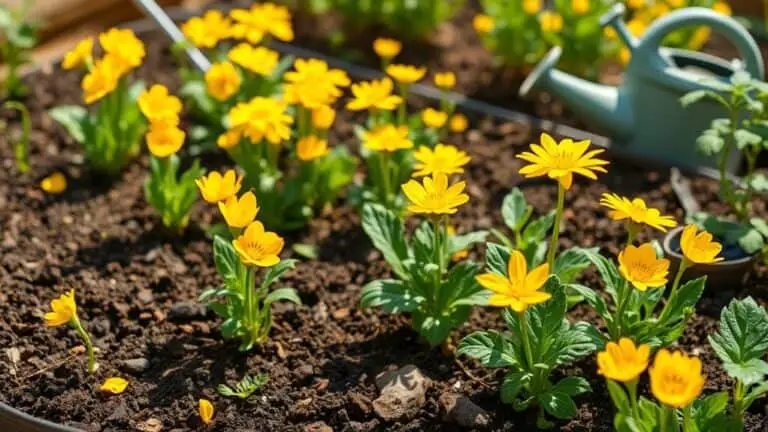What To Feed The Worms For Healthy Garden Compost
When it comes to feeding worms for healthy garden compost, I've found that a diverse diet of organic plant materials works best. Think old lettuce, rotten vegetables, and sweet fruits like bananas and apples. Adding vegetable scraps, grains like bread in moderation, and occasional coffee grounds with crushed eggshells can boost the nutrient content. Chopping or blending these scraps speeds up decomposition, making them easier for worms to digest. But it's essential to avoid certain items and manage feeding amounts carefully. So, how do you balance their diet and monitor their health effectively?
Ideal Worm Foods
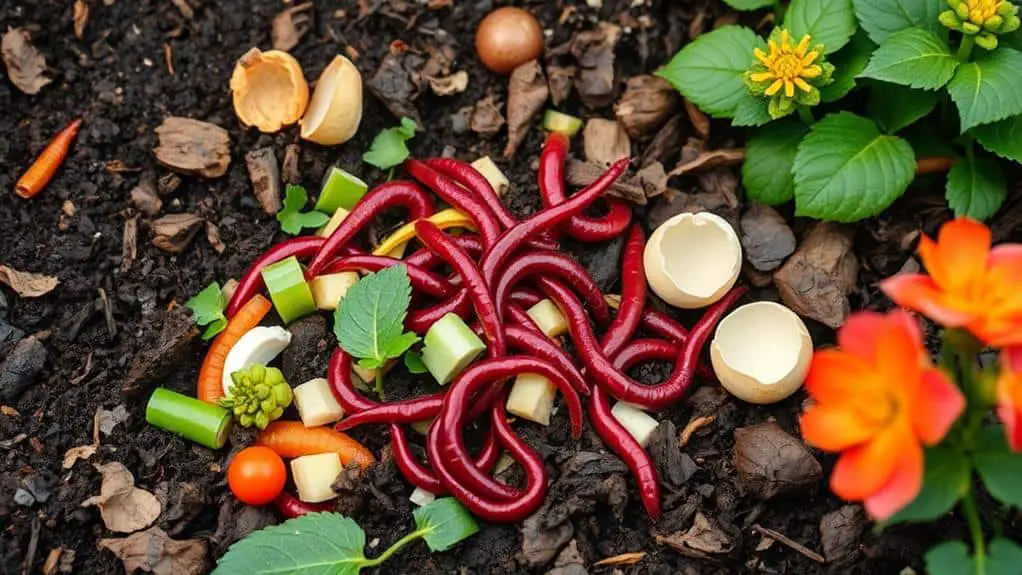
When it comes to feeding worms for healthy compost, a diverse diet of organic plant materials guarantees they thrive.
In your worm bin, focus on providing food scraps like old lettuce, rotten vegetables, and sweet fruits such as bananas and apples. Chop or blend these scraps into smaller pieces to speed up decomposition and make them easier for worms to consume.
It's also beneficial to add coffee grounds and crushed eggshells, which supply essential nutrients and calcium.
By maintaining a balanced diet of various organic waste types, you enhance the composting process. This results in rich worm castings, which are great for your garden.
Follow these guidelines, and you'll have happy worms and fantastic compost in no time!
Avoid These Items
While a balanced diet is important for your compost worms, it's equally essential to know what foods to avoid. Citrus fruits, such as oranges and lemons, are too acidic and can harm your worms.
Similarly, garlic and onions should be excluded because worms tend to avoid them. Meat and dairy products, along with fats and oils, can create unpleasant odors and attract pests.
Additionally, never add pet feces from dogs, cats, or birds to your worm bin, as they carry harmful bacteria.
Finally, avoid non-plant materials like plastic bags, rubber bands, and aluminum foil, which clutter the compost and hinder the process.
Following these guidelines will keep your worms happy and your compost healthy.
Feeding Frequency
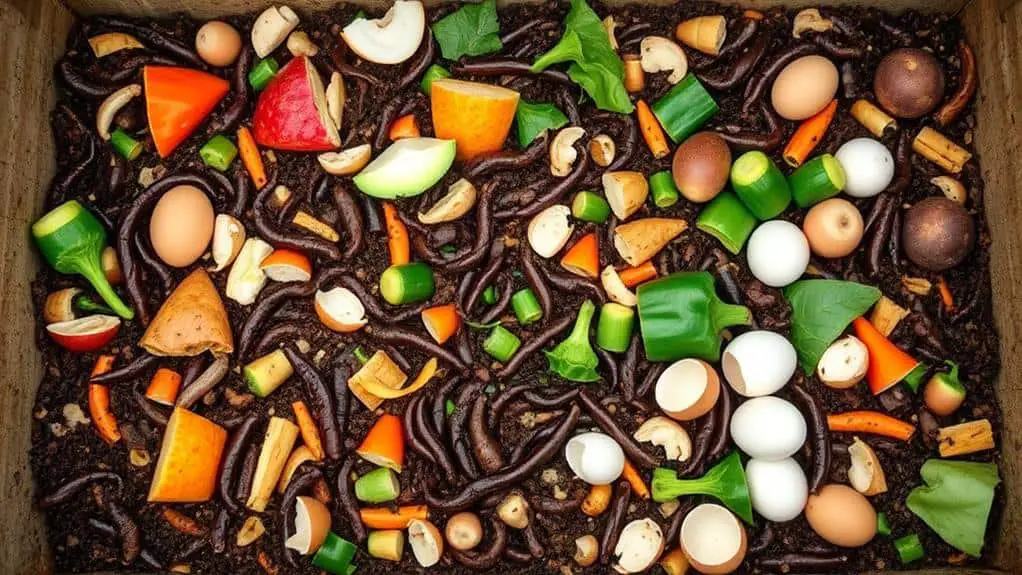
Feeding frequency is essential for maintaining a thriving worm bin. I recommend feeding your worms once or twice a week. This allows them to process the food and keeps their environment healthy.
Composting worms can eat up to half their body weight in food daily, but you should adjust the amount based on the worm population and bin conditions. Cut or break food into small pieces to help with faster decomposition.
Always bury the food under bedding materials to minimize odors and maintain cleanliness. It's important to regularly check food levels after a few days. This way, you can monitor consumption and prevent overfeeding, which can cause imbalances and unwanted smells in your bin.
Organic Waste Options
Understanding the variety of organic waste options for your worm bin is key to creating rich, healthy compost. Compost worms, especially red wigglers, thrive on an assortment of organic food waste. They love fruit and veggie scraps like banana peels, old lettuce, and spoiled fruits. Cutting these into smaller pieces helps them consume it faster. Vegetables such as potato peels and carrot tops are also great, along with moderate amounts of grains like bread.
| Type of Waste | Examples | Notes |
|---|---|---|
| Fruit and Veggie | Banana peels, Lettuce | Cut into small pieces |
| Vegetable Scraps | Potato peels, Carrot tops | Excellent for worm bins |
| Grains | Bread, Cake | Feed in moderation |
| Coffee Grounds | Used coffee grounds | Use sparingly to avoid acidity |
| Eggshells | Crushed eggshells | Provides essential calcium |
Avoid citrus, garlic, onions, and meat to keep your worms healthy.
Managing Overfeeding
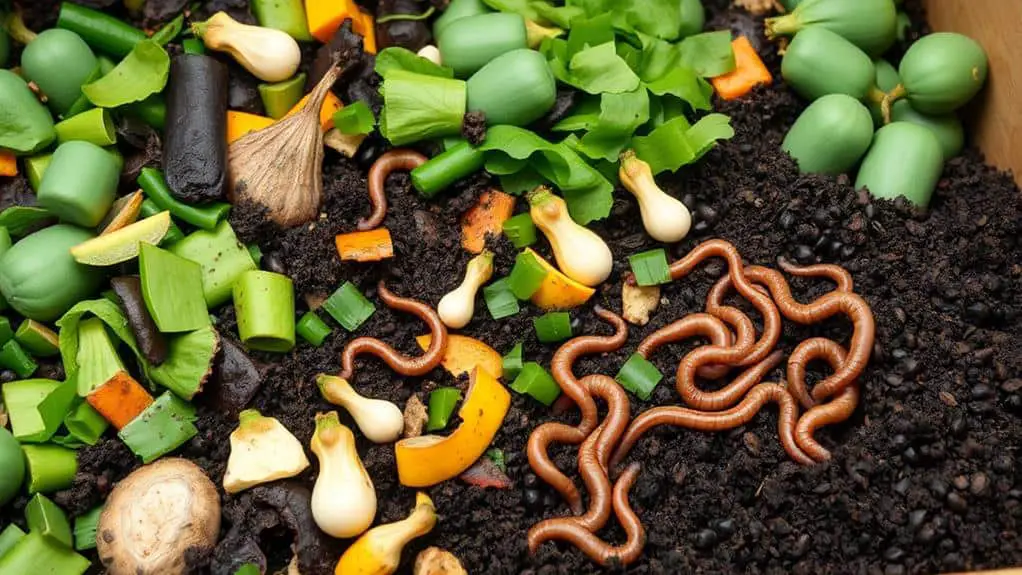
Managing overfeeding in your worm bin is essential for maintaining a healthy composting environment.
Watch for signs like rotting food and bad smells, which indicate you've added too much for your worms to handle.
Feed them small amounts once or twice a week, and check for leftover food to adjust your future feedings, ensuring a balanced diet and happy worms.
Signs of Overfeeding
One telltale sign that you're overfeeding your worm bin is the presence of excess food that sits uneaten for several days, creating unpleasant odors and attracting pests.
If you notice more fruit flies or other pests around the bin, it's a clear sign that the food isn't breaking down fast enough. Overfeeding can also cause the moisture levels to rise, making the bin soupy.
When worms eat less and avoid certain areas, it means conditions are becoming unfavorable. Regularly check the bin and adjust the food you add based on how quickly it's decomposing.
Keeping a balance helps maintain a healthy environment for the worms and prevents overfeeding problems.
Balanced Feeding Practices
Noticing the signs of overfeeding means it's time to adopt balanced feeding practices to keep your worm bin healthy.
In worm composting, it's key to feed the worms small amounts of organic matter regularly. Start with less food, checking the bin every few days to see if there's leftover food. This helps prevent odors and imbalance.
Use the "One Spot Rule" by placing food in one area, making it easier for worms to break it down. If you overfeed, it can cause anaerobic conditions, so maintain around 70% moisture.
To speed up consumption, cut or blend food scraps into smaller pieces. This will help worms digest food faster and keep your compost bin thriving.
Bin Maintenance Tips
Maintaining your worm bin is essential for healthy compost production.
First, regularly check and aerate the bedding material in your worm bins to prevent anaerobic conditions and keep oxygen levels ideal for your worms' health.
It's also important to monitor moisture levels, aiming for around 70% humidity. If the bin gets too wet, mix in some dry shredded paper to absorb excess moisture and avoid overheating.
Protect your bin from extreme temperatures and direct sunlight, keeping it above 5 degrees Celsius.
Remove worm castings regularly to prevent nutrient depletion and keep your worms active.
Use a diverse mix of bedding materials like newspaper, brown grass, and peat moss.
This balanced environment supports effective composting of your kitchen waste.
Balancing Diet
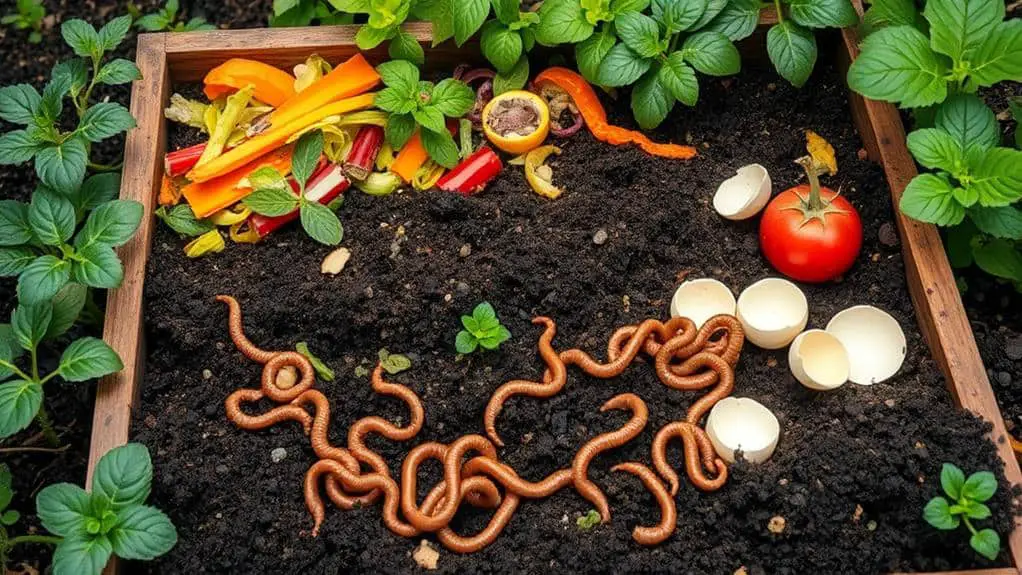
Balancing your worms' diet is key to keeping them healthy and your compost thriving.
Feed them a variety of fruits and veggies like banana peels and potato scraps, and mix in carbon-rich materials like shredded paper.
Variety of Food
A well-rounded diet for composting worms is essential to foster their health and efficiency in breaking down organic matter.
I always include banana peels, coffee grounds, veggie waste, and egg shells to provide a variety of food. Banana peels and other fruit scraps offer essential nutrients, while coffee grounds and crushed egg shells boost calcium levels, enhancing compost quality.
By offering a mix of items like pumpkin and squash, I guarantee the worms get a diverse diet, which supports their growth and reproduction.
Regularly monitoring what they prefer helps me adjust their diet accordingly. This variety keeps the worms happy and active, leading to richer compost for my garden.
Balancing their food intake is key!
Moderation in Feeding
While providing a variety of food is important, I've learned that moderation in feeding is just as critical for maintaining a healthy compost bin.
Feeding worms sparingly, with just a few handfuls of food scraps at a time, helps avoid overloading the bin. Worms can consume up to half their body weight in food daily, but usually, they eat much less.
It's crucial to monitor their activity and waste decomposition to adjust feeding amounts. Overfeeding can cause food rot, which leads to bad odors and unhealthy conditions.
To keep a balanced diet and efficient composting, introduce various organic materials but avoid too much of any single type.
Burying food scraps under bedding reduces odors and encourages worms to actively break down the food.
Prohibited Foods
In the domain of composting with worms, it's crucial to know what foods are off-limits to keep your worm bin healthy.
Prohibited foods include citrus fruits, which have high acidity levels that can harm or kill your worms. Garlic, onions, and peppers are also no-go's since worms avoid them.
Stay clear of meat and dairy products because they can turn rancid, create bad smells, and attract pests. Fats and oils fall into the same category.
Avoid throwing in non-plant materials like plastic bags and aluminum foil; they don't break down.
Finally, never add pet waste from cats or dogs, as it carries harmful pathogens and can cause odors.
Stick to these guidelines to keep your worm bin thriving!
Nutrient Sources
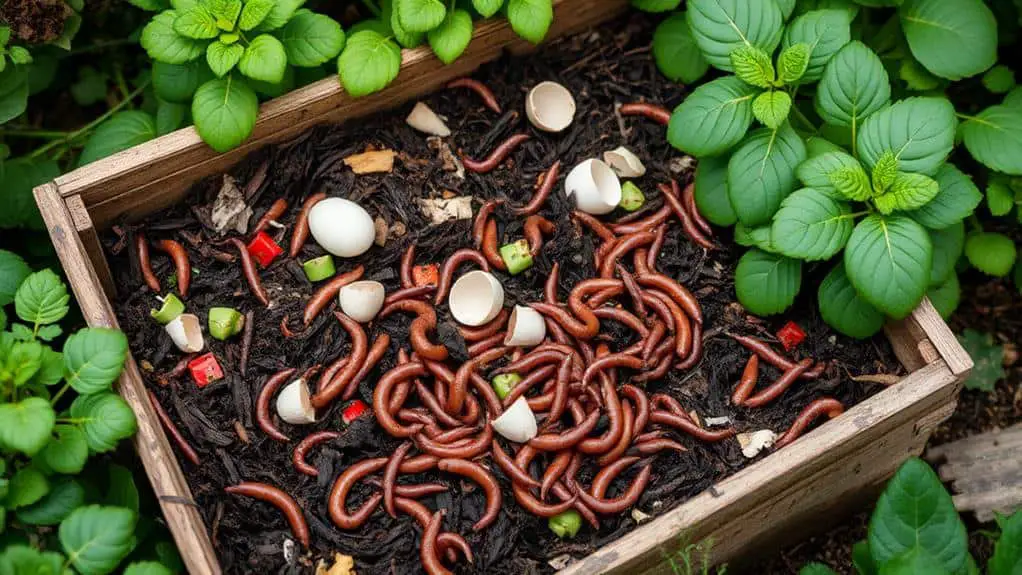
After covering what not to feed your composting worms, let's explore the nutritious options that will keep your worm bin productive and healthy.
For red wiggler composting, start with fruit and vegetable scraps. Bananas and cucumbers break down quickly and are high in sugar, which worms love.
Use a food processor to grind eggshells into powder; this adds essential calcium. Pre-composted manures like rabbit or horse manure are excellent, balancing the carbon and nitrogen levels.
Add spent coffee grounds in moderation for extra nutrients, but remember they're acidic. Shredded paper can be used to balance moisture and carbon.
Soft bread and spoiled fruits also make great additions. These ingredients will enrich your compost, producing nutrient-rich worm castings.
Monitoring Worm Health
A healthy worm bin is the cornerstone of productive composting. To guarantee your worms thrive, you need to monitor their environment closely. Here's a simple guide:
1. Check Moisture Levels: Aim for about 70% humidity. The bedding should feel like a damp sponge.
Too much or too little moisture can harm your worms.
2. Observe Worm Behavior: Healthy worms are active and wriggling, especially around food.
Sluggish or missing worms might mean there's a problem with their food or environment.
3. Watch for Odors: A well-maintained bin shouldn't smell bad.
Unpleasant odors may indicate overfeeding or poor ventilation.
Frequently Asked Questions
What Should I Feed My Compost Worms?
I feed my compost worms the best worm foods like vegetable scraps and fruit peels. This nutrient-rich compost worm diet helps recycle kitchen waste. I maintain a worm feeding schedule, adjusting based on their consumption and decomposition rates.
How to Fatten up Compost Worms?
To fatten up compost worms, I feed them diverse scraps, ensuring high moisture and balanced nutrients. Regular feeding frequency, ideal temperatures, and selecting the right worm species boost worm growth and compost quality.
What Do You Feed Earthworms to Keep Them Alive?
To keep earthworms alive, I feed them organic matter like fruit and vegetable scraps. Maintaining their worm habitat with proper moisture levels and monitoring their worm life cycle guarantees composting benefits, keeping the environment balanced and healthy.
Are Coffee Grounds Bad for Compost Worms?
Coffee grounds benefit compost worms if used moderately. I recommend adjusting worm feeding frequency and mixing grounds with other materials. Avoid composting mistakes like overloading. For worm health tips, maintain moisture balance. This also aids garden pest control.
Conclusion
Feeding your garden worms the right mix of organic scraps can make all the difference in creating rich compost. Remember to give them a variety of fruits, vegetables, grains, and occasional coffee grounds, but avoid citrus, garlic, and meat. Monitor their diet to prevent overfeeding and keep an eye on their health. With a balanced, nutrient-rich diet, your worms will thrive, and so will your garden. You're well on your way to becoming a composting pro!

